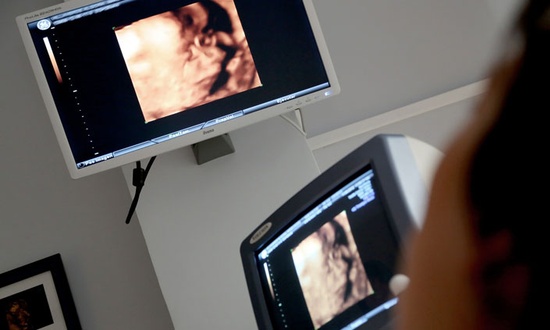Since abortion ends the life of a real, although unborn, person, and that person goes to Heaven, in what form do they exist in Heaven? Further, what about when a miscarriage happens? Does that child go to Heaven, and if so, in what form do they exist eternally?
Answered by Marshall Beretta, EPM volunteer
Your question about what the resurrection body of an infant might look like, is one that the Bible is not quite specific on. Much caution should be exercised as we try to discern an answer that is compatible with God’s revealed truth. I believe we can come to a position that is satisfying and does not contradict Scripture. At the same time, others may arrive at a different position with equal comfort. Generally, if God has not seen it important to clearly reveal His truth about an issue, then it is an issue where the resulting ambiguity is not paramount to a relationship with Him. We shall just have to look forward to eternally learning at the feet of the Master to have all the exciting “blanks” filled in.
We will not have the exact body we had on earth—Paul’s famous passage about our Heavenly body is found in 1 Corinthians 15: 41-44. “There are also heavenly bodies and earthly bodies, but the glory of the heavenly is one, and the glory of the earthly is another. There is one glory of the sun, and another glory of the moon, and another glory of the stars; for star differs from star in glory. So also is the resurrection of the dead. It is sown a perishable body, it is raised an imperishable body; it is sown in dishonor, it is raised in glory; it is sown in weakness, it is raised in power; it is sown a natural body, it is raised a spiritual body. If there is a natural body, there is also a spiritual body.” From these words we may conclude that we will have a different body. It will not have blemish, infirmity, or weakness. Our bodies will be distinctive somehow—i.e. various glories. They will be somehow physical, but not the corrupted material of the present earth. I think that an infant’s body—especially one aborted or miscarried—would be deficient, weak, unable to mentally respond. The elderly would be weak, infirmed, diseased.
Our resurrected body will be similar to Christ’s—”We know that, when He appears, we shall be like Him, because we shall see Him just as He is” (1 John 3:2).
We will be recognized as individuals, but not necessarily exactly like our earthly form—several passages infer this conclusion. Jesus, after His resurrection, is not immediately recognized by sight; but, as soon as He expresses His person immediate recognition results. Mary at the tomb: “Supposing Him to be the gardener, she said to Him, ‘Sir, if you have carried Him away, tell me where you have laid Him.’ ...Jesus said to her, ‘Mary!’ She turned and said to Him in Hebrew ‘Rabboni!’” (John 20:15- 16). Jesus appearing to His disciples—”When therefore it was evening, on that day, the first day of the week, and when the doors were shut where the disciples were, for fear of the Jews, Jesus came and stood in their midst, and said to them, ‘Peace be with you.’ And when He had said this, He showed them both His hands and His side. The disciples therefore rejoiced when they saw the Lord” (John 20:19-20).
Some essence of our Heavenly bodies must be present in our current physical bodies. We are told that in the last days the dead will be raised from their grave: “Behold, I will open your graves and cause you to come up out of your graves, My people; and I will bring you into the land of Israel” (Ezek. 37:12). Also the sea: “And the sea gave up the dead which were in it....” (Rev. 20:13). Paul seems to echo the same issue when He uses the growing of a seed analogy when addressing our natural and spiritual bodies: “and that which you sow, you do not sow the body which is to be, but a bare grain, perhaps of wheat or of something else. But God gives it a body just as He wished, and to each of the seeds a body of its own” (1 Cor. 15:37-38). In each unique physical body of one of God’s children, there is apparently a creative kernel that is used by God to fashion the unique spiritual body which will live in Heaven.
Our heavenly bodies will not retain bad memories, failures, or lingering affects of trauma—the old things have passed away. The new things are oriented to glorifying God and willingly submitting to His eternal purpose. “And He shall wipe away every tear from their eyes; and there shall no longer be any death; there shall no longer be any mourning, or crying, or pain; the first things have passed away” (Rev. 21:4).
Finally, our heavenly body may have a radiance of some kind—probably not essentially, but reflectively, due to our face-to-face association with the Lord of Glory. Moses on Sinai (Ex. 34:35); the mount of Transfiguration (Matt. 17:2). We are told that Heaven is lit by the Glory of God: “And the city has no need of the sun or of the moon to shine upon it, for the glory of God has illuminated it, and its lamp is the Lamb” (Rev. 21:23). The Resurrected Christ is described in Revelation 1:13-17. We are described as “shining” in both Daniel and Matthew: “And those who have insight will shine brightly like the brightness of the expanse of heaven” (Dan. 12:3); “Then the righteous will shine forth as the sun in the kingdom of their Father” (Matt. 13:43).
What can we conclude from our brief investigation of the Scriptures about any infant (aborted or miscarried), or child who dies while mentally incompetent to discern morality? First, they have been called and regenerated by the grace of God unto eternal life. They will have a resurrected body basically similar to all other saved individuals. It appears that our resurrected bodies will be imperishable; physical; identifiable as to the unique individual; will show no imperfection, lack, weakness, disability, illness, sorrow, or have lingering bad memories. By this I deduce that underdeveloped fetuses or children will have mature spiritual bodies: “For our citizenship is in heaven, from which also we eagerly wait for a Savior, the Lord Jesus Christ; who will transform the body of our humble state into conformity with the body of His glory, by the exertion of the power that He has even to subject all things to Himself” (Phil. 3:20-21).






